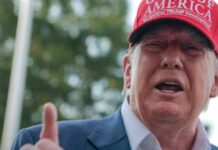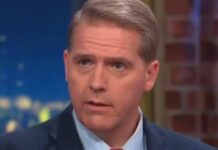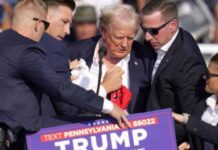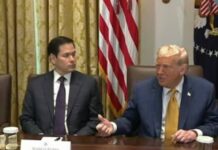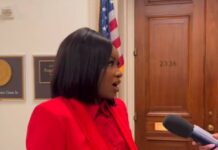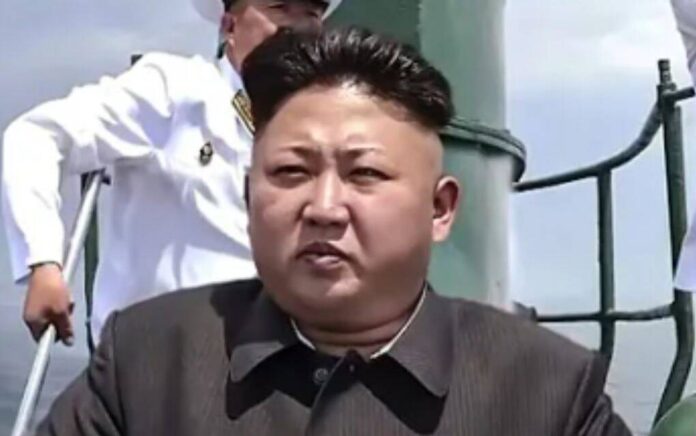
The United States is hit with threats all the time. But this is taking things to a whole new level.
And the Pentagon is on high alert after this U.S. enemy makes a nuclear threat.
North Korean dictator Kim Jong-un marked the anniversary of the Korean People’s Army (KPA) with a scathing denunciation of the United States, blaming Washington for global conflicts and pledging to expand his country’s nuclear capabilities. Speaking during a visit to North Korea’s Defense Ministry, Kim accused America of being the driving force behind international crises and insisted his regime would bolster its military power in response.
His remarks, reported by the state-run Korean Central News Agency (KCNA), were his first extended comments on the United States since President Donald Trump was sworn in for a second term.
The regime, which controls all information available to its citizens, confirmed Trump’s inauguration without ever acknowledging the election and had largely remained silent until earlier this month, when state media lashed out at Secretary of State Marco Rubio for calling North Korea a “rogue state.”
Blaming the U.S. for Global Conflicts
Kim’s speech painted the United States as the chief instigator of conflicts worldwide. He referenced the war in Gaza, the Russian invasion of Ukraine, and turmoil in Syria, placing responsibility squarely on Washington.
“Summarizing the features of the world-wide changes in political, military and geopolitical structure including the surrounding environment of the state,” KCNA reported, “he [Kim] stressed the need to more highly develop the war response posture of the DPRK’s [North Korea’s] armed forces to proactively cope with any variable security situation.”
Despite his aggressive rhetoric, Kim insisted that North Korea does not seek unnecessary tension. “The DPRK does not want unnecessary tension of the regional situation,” he claimed, adding that his regime would take “sustained countermeasures” to maintain a military balance and prevent war. However, his vow to ramp up nuclear weapons production signals anything but de-escalation.
Strengthening Ties with Russia
Kim reaffirmed his support for Russia’s war in Ukraine, where North Korean troops are believed to be fighting alongside Moscow’s forces. He also vowed to push ahead with illicit nuclear development. “Referring to a series of new plans for rapidly bolstering all deterrences including nuclear forces, he clarified once again the unshakable policy of more highly developing the nuclear forces,” KCNA stated.
His comments come amid growing military cooperation between Pyongyang and Moscow.
U.S. and Japan Respond
Kim’s speech followed a high-profile meeting between President Trump and Japanese Prime Minister Ishiba Shigeru at the White House last week. The two leaders discussed the North Korean threat in detail, later issuing a joint statement emphasizing their shared commitment to denuclearization and condemning Pyongyang’s deepening ties with Russia.
Trump and Ishiba “expressed their serious concerns over and the need to address the Democratic People’s Republic of Korea’s (DPRK’s) nuclear and missile programs,” the statement read. The two also called for an end to North Korea’s “malicious cyber activities and the DPRK’s increasing military cooperation with Russia.”
North Korean state media did not acknowledge the meeting, but Japan remains one of Pyongyang’s most frequent targets of hostility. Trump, meanwhile, reiterated his focus on the North Korean issue. North Korea “will always be a topic, especially with Japan,” he told reporters ahead of his meeting with Ishiba.
Kim’s Strategy Moving Forward
During his first term, Trump took an unconventional approach to North Korea, holding direct talks with Kim and even stepping onto North Korean soil in 2019. However, with Kim ramping up his rhetoric and strengthening ties with Russia, the possibility of renewed diplomacy remains uncertain. Instead, Pyongyang appears committed to advancing its nuclear arsenal and leveraging global instability to its advantage.
As tensions rise, the world watches closely to see whether North Korea’s growing defiance will provoke further conflict—or whether diplomatic efforts can steer the crisis toward a peaceful resolution.
Stay tuned to The Federalist Wire.


